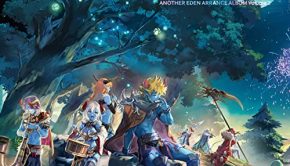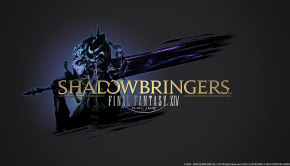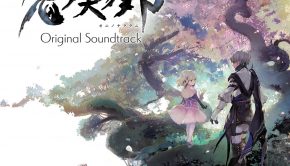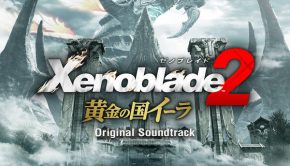Maki Kirioka Interview: From Konami to Procyon Studio
 Maki Kirioka is a veteran composer from Konami that now works at Yasunori Mitsuda’s Procyon Studio. During her 13 years at Konami Computer Entertainment Tokyo, Kirioka was involved in many major projects, including the Metal Gear Solid, Yu-Gi-Oh!, Tokimeki Memorial, and Elebits franchises. However, she is probably best known for serving as the sound director for the Zone of the Enders series and composing its unforgettable vocal themes.
Maki Kirioka is a veteran composer from Konami that now works at Yasunori Mitsuda’s Procyon Studio. During her 13 years at Konami Computer Entertainment Tokyo, Kirioka was involved in many major projects, including the Metal Gear Solid, Yu-Gi-Oh!, Tokimeki Memorial, and Elebits franchises. However, she is probably best known for serving as the sound director for the Zone of the Enders series and composing its unforgettable vocal themes.
Since meeting at Symphonic Fantasies, Maki Kirioka and I have wanted to do an interview together for some time. In what turns out to be her first major interview to date, Kirioka reveals much about her career and background. After reminiscing about her Konami projects, she provides an exclusive look into her latest works at Procyon Studio — Luminous Arc 3: Eyes and the Guwange Arrange Album. Expect to hear lots from Kirioka-san in the future.
Interview Credits
Interview Subject: Maki Kirioka
Interviewer: Chris Greening
Editor: Chris Greening
Translation & Localisation: Shota Nakama
Coordination: Yoshie Miyajima
Interview Content
Chris: Maki Kirioka, thank you for talking to us today. First of all, could you discuss your background and what led you to become a video game musician?
Maki Kirioka: I was always very interested in music since I was little. I started taking lessons for electronic organ when I was seven, and I began to enjoy making music since I composed for an exam when I was nine years old. Also I had great experience participating competitions playing the trombone in school brass bands through my middle school to high school. After graduating a high school, I majored electronic organ and minored in composition at a music school, Tokyo Conservatoire Shobi.
I gave lessons for the electric organ and performed at restaurants while in school as I was also studying various styles of music and MIDI sequencing. I thought I would be good at doing the game music, which requires a wide range of musical genres, so I started working at a game company, Graphic Research.
Chris: Your early game works were on Super Nintendo games like Mickey’s Tokyo Disneyland Adventureand Derby Jockey 2. Could you discuss your experiences on such projects? What then inspired you to join Konami Computer Entertainment Tokyo?
Maki Kirioka: Micky’s Tokyo Disneyland Adventure was something that I really enjoyed working on with Yoko Suzuki and Shigenori Mazuko. I was also in charge of the sound effects, and it was so difficult to make Donald Duck’s voice! Back then I was using this system called MML — Music Macro Language — to make the sound effects and music. I remember mixing the oboe and clarinet sound on a sequencer to make the voice, and it took a very long time to get something that was convincing.
When Derby Jockey 2 was at the initial development stage, I built the image of the music by going to Tokyo Racecourse to have a close look of the powerful racehorses. I also learned about the history of the horse racing from different angles in the horse race museum that was in the racecourse facility.
I was given so many great opportunities like the ones I have mentioned at the company, Graphic Research, where I began my career. It was around the third year there when I started thinking that I would like my music to reach more people. I applied to Konami because they had a recruiting ad on a music magazine that I found by chance, and that is how I started working there.

Chris: At Konami, you were first in charge of leading the three volumes of the Tokimeki Memorial Drama Series for the Saturn and PlayStation. How did you create a suitable tone for these games? Did you individualise each score to depict the main character in question?
Maki Kirioka: Tokimeki Memorial Drama Series Vol. 1 was my very first work when I joined Konami and I have a lot of fond memories from it. I kept the image and arranged the standard tunes from the original Tokimeki Memorial, like the themes of the various characters. While incorporating the melody fragments from the themes for the comical, tense, and emotional scenes, I tried to create a certain consistency throughout the whole game. Besides that, I tried to synchronise myself with the main character and feel the dialogues as if they were real, and I worked on the music to help bringing up the story by referring to the music from the television drama version.
For Tokimeki Memorial Drama Series Vol. 2 ~Aya’s Love Song~, I was given an opportunity to compose the insert song “Like Sunday’s Rain” with a vocalist for the first time. I also did the ending themes “Shiawase no Image (The Image of Happiness)” and “Hoshizora no Power (The Power of a Starry Sky)” for Tokimeki Memorial Drama Series Vol. 3 ~Poem of Departure~ They were all good learning experiences for me — I learned the depth of vocal music and how fun it is to compose songs.
Chris: You also had a guest role on the original Metal Gear Solid. Could you discuss your experiences arranging and performing “Enclosure” on piano. Is piano-based music a speciality of yours?
Maki Kirioka: The original version of “Enclosure” has a big ensemble piece, and I was asked to make a piano arrangement of it. I put feelings into every note while arranging, in order to foster the scene with the simple tone of the piano. It is not that piano music is my speciality, although I also incorporated a lot of piano pieces for Tokimeki Memorial Drama Series too. The piano is just often my choice when simply trying to reach straight to the heart.
Chris: You reunited with Hideo Kojima to lead the scores for Zone of the Enders and its sequel. Could you discuss your electronic and vocal themes for these projects? How was it to work on such major titles?
Maki Kirioka: Firstly I worked on the ending themes, “Flowing Destiny” and “A Light with a Name of Hope” for Z.O.E. I asked Daisaku Kume, whom I am a huge fan of, to arrange them and he used a tons of live instruments including himself playing the piano. He made the arrangements sound so gorgeous. For the vocal part, I asked Maiko Horisawa to sing it because I totally fell in love with her tender and sophisticated voice; the way she sings is just so unique and tasteful. Later we found out that she was originally an opera singer and thus we decided to have her sing some operatic chorus parts. For the title screen I tweaked her voice a bit and used it too. There were a lot of arrangements of “Flowing Destiny” throughout the game to build it toward the ending too.

For the sequel, ANUBIS Zone of the Enders, I composed the theme song “Beyond the Bounds” and again oversaw Kume arrange it. We had Asuka Kaneko — who did a fantastic performance on Kume’s albumEastern Shore — playing an improvised solo and that was just so amazing. Kume also introduced me to a great singer Maki Kimura, and she sang some difficult phrases without any problems. She sang atPRESS START: Symphony of Games 2006 for us too. We build a strong team through working with a lot of people like these; it enabled us to conceive such an energetic overall project.
The incredible trailer clip from “Beyond the Bounds”, created by Hideo Kojima, was just absolutely stunning. The game itself is also really fun and interesting, remaining popular even to this day. I feel very lucky to be involved in such masterwork.
Chris: Your later years at Konami were dominated by the Yu-Gi-Oh! franchise. What were the musical and technical challenges of these productions? Do you regret no soundtracks have been released for these projects?
Maki Kirioka: There had already been so many Yu-Gi-Oh! games, so I kept the series’ image, but aimed on providing some freshness to the music. It was a great project to work on, because the story was connected with the anime version and was very interesting and sophisticated.
Yu-Gi-Oh! Nightmare Troubadour was my first DS game that I worked on. Simultaneously I was involved with developing an original sound driver in order for us to create the audio smoothly and easily for the DS. This high quality sound driver definitely helped creating a better environment for the composers.
I certainly would have liked it if the soundtracks were available, because I have done so many Yu-Gi-Oh! games and have put so much into them. But I would also be happy if the music remains as one with the game for the fans out there.
Chris: Before you left Konami, you also had roles on two light-hearted games. Did you enjoy composing youthful music for Dewy’s Adventure?
Maki Kirioka: I worked with Hiroshi Tanabe as a co-composer on Dewy’s Adventure. Our main inspiration was the main character Dewy and other enemies. We tried to express the individuality of the characters with the music and tweaked the music to have the distinct world’s image come out more. All the team members came together to sing the theme song “Rainbow Smile”, which was so much fun to record. Carole Blackschleger’s voice perfectly fit in the image of the song and made it a nice children’s song too.

Chris: In addition, how does your score for Elebits: The Adventures of Kai & Zero compare with its predecessor?
Maki Kirioka: Elebeits: The Adventure of Kai & Zero differs a little from the original Wii game. In fact, it was more like an action adventure game in which you develop the main character through a very emotional, heart-warming story. So for the parts where the story related with the past game, I followed the movie piece that Michiru Yamane had composed for the prequel and focused on creating music that helps listeners to be attached with the game. Once again I worked with Tanabe to do the music for the stages. We tried to create the music to give a vivid image of the stages, even if you only listen to the music.
Chris: In 2008, you left Konami to become a composer at Yasunori Mitsuda’s Procyon Studio. Why did you make this decision? Have you enjoyed your time at the company so far?
Maki Kirioka: Since around 2006, I was doing composition works in parallel to external music management and sound team management in Konami. Therefore I had an increasing desire to put more focus on creating music. Just when I was thinking of changing my job, I had a chance to meet Yasunori Mitsuda, whom I had been a friend with, yet had not met for a while. It was really a good timing and I joined his company Procyon Studio.
The CEO, Mitsuda, himself is a great composer, so he understands the environment and methods for composing music really well. It is a very nice and cosy place where I have fun working at. I get a lot of support from him and I can work at my own pace.
Chris: During the transition, you have worked on several Arcade games, including Grand Cross Premium. What inspired your decision to start working on Arcade games and how did you approach these particular scores?
Maki Kirioka: When composing for Arcades, I imagine creating something that can be heard within such a noisy environment. As a result, I purposely write easy melodies with some flashy sounds. Actually, though, I only contributed one piece for Konami’s Grand Cross Premium.
Chris: Last year you also co-composed the DS title Luminous Arc 3: Eyes. What should we expect from your contributions to the soundtrack? In particular, could you discuss your vocal theme from the game?
Maki Kirioka The concept of Luminous Arc 3 was “change”, so I was asked to include electric sounds and the musical genres to give different tastes from the previous ones.
The theme song “Wake Up World” was the first song that I made for the game, and I composed, arranged, and wrote the lyrics to it. We were able to add the strings, guitar, bass, and many other live instruments since Mitsuda produced it, and that resulted in the song becoming an especially gorgeous one. For the singer, Mitsuda asked me to listen to a demo by CHiCO (ACE) and I was so impressed with her voice that I asked her to sing for the song; her powerful high tones and attractive voice really went well with the image of the song.
We also made the full version of the soundtrack that is not in the game, but it is on the soundtrack. It came out on the March 3, and I would be happy if you listen to it. Tsuchiya and I put so much effort into the total of 43 pieces on the game. The soundtrack will remind you the story of the game and I am sure you will have a great time listening to it.

Chris: Finally, you recently arranged the boss theme for the Guwange Arrange Album. How did you become involved in this project? Could you discuss what you offered?
Maki Kirioka: Through Mitsuda, I was introduced to the president of Ge-On-Dan, Yuji Takenouchi, and that led me to do the arrangement of the boss theme for the Guwange arrange album. This was the first volume of a series of exclusive projects by Ge-On-Dan for Cave.
I arranged it pretty freely using the motifs of the melody, and eventually I used live instruments for all the parts. For the vocals, I brought in a particular energetic singer called Kyoko Natsume, who is well known for singing “Eien no Traveler (Forever Traveler)” from the shooting game TRIZEA and now sings with the unit Avant Girl. The cellist was Chizuko Sato, a wonderful player who can reach your heart with her tone. Lastly the avantgarde technician Hiroshi Tanabe, who I previously worked with at Konami, played the guitar, bass, and percussions. He also did the guitar and bass for Luminous Arc 3theme song “Wake up World”. Finally, I did the piano part.
You can feel the intensity coming from everyone’s personality on the CD and I think the project turned out to be quite incredible. I am very much honored to work with so many great composers on this album and it was an exciting, valuable experience for me. I hope this arrange album will be listened to by many people.
Chris: Thank you for your time, Maki Kirioka. Is there anything you would like to say to your fans around the world?
Maki Kirioka: Thank you so much for supporting me always! I would be happy if I can deliver the inspirational music that can reach your heart in the future. Through this wonderful project and this interview, I am so grateful to meet all of you. Thank you so much. I wish a lot of happiness for everyone.
Many thanks to Yoshie Miyajima and Yasunori Mitsuda for coordinating this interview. Thank you to for Shota Nakama for his wonderful translations as always. Look for an interview with Procyon Studio’s other composer, Shunsuke Tsuchiya, to be published in coming days.
Posted on March 15, 2010 by Chris Greening. Last modified on March 2, 2014.














